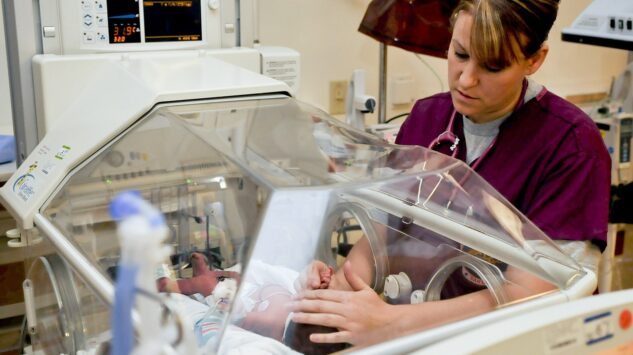Issue Briefs

How Machine Learning is Shaping the Future of Newborn Genetic Screening
By Janice Tagoe, MBA, MSc.,
May 13, 2025 – Advancements in artificial intelligence and genomics are rapidly transforming the landscape of public health. One of the most promising areas of this intersection is newborn screening, where data-driven tools are helping to reimagine how we detect and respond to genetic conditions from the earliest moments of life.
In a paper published this year (2025), researchers at Mass General Brigham unveiled a machine learning model designed to improve how genes are selected for newborn genomic sequencing programs. This development comes at a critical time, as more than 30 countries work to expand their newborn screening efforts. Yet, among these initiatives, the criteria for selecting which genes to screen vary widely. Some programs screen fewer than 150 genes, while others assess more than 4,000. Yet only 74 genes are consistently included across the majority of them. This lack of standardization presents a challenge to equal access to global health resources and limits the potential of these programs to deliver timely, life-saving care.
A More Strategic Approach to Gene Selection
To address this, the Mass General Brigham team developed a data-driven model that ranks genes using 13 predictive criteria. These include whether a gene is part of the U.S. Recommended Uniform Screening Panel, whether sufficient clinical data is available, and whether early interventions are efficient. The result is a flexible, evidence-based ranking system that can adapt over time and across regions.
As Dr. Nina Gold of Massachusetts General Hospital explains, this model gives policymakers and clinicians a practical tool for aligning gene selection with public health goals and emerging scientific evidence; something increasingly vital as genomic medicine continues to evolve.
Improving Accuracy Through Innovation
Standardizing what genes to screen is one part of the equation; improving the accuracy of screening itself is another. BeginNGS, a platform developed by the Rady Children’s Institute for Genomic Medicine, integrates genome sequencing with AI-powered interpretation tools to dramatically improve screening reliability. Clinical studies show that BeginNGS reduces false positives by 97 percent while maintaining over 99 percent sensitivity, a combination that minimizes stress for families and helps healthcare providers act faster when urgent intervention is needed.
Insights from the BabySeq Project
The BabySeq Project, a randomized clinical trial also led by Mass General Brigham, underscores the value of early insight. By sequencing infants’ DNA shortly after birth, researchers were able to identify potentially life-threatening but treatable conditions, sometimes well before symptoms appeared. This kind of early diagnosis can significantly improve outcomes and demonstrates the real-world value of integrating genomics into routine newborn care.
Laying the Groundwork for a Global Standard
Together, these initiatives point toward a new paradigm in public health. One where artificial intelligence, genomics, and thoughtful policy design work in concert to deliver better care from day one.
The challenge now is to ensure these tools are implemented responsibly and equitably. That will require continued collaboration between researchers, governments, public health institutions, and the private sector. Models like the one developed by Mass General Brigham and platforms like BeginNGS are not just scientific milestones. They are foundational components of a global effort to standardize, scale, and strengthen newborn screening in the years ahead.
Legal Disclaimer:
The Global Policy Institute (GPI) publishes this content on an “as-is” basis, without any express or implied warranties of any kind. GPI explicitly disclaims any responsibility or liability for the accuracy, completeness, legality, or reliability of the information, images, videos, or sources referenced in this article. The views expressed are those of the author and do not necessarily reflect the opinions or positions of GPI. Any concerns, copyright issues, or complaints regarding this content should be directed to the author.
 |
Janice Tagoe is a multifaceted data analytics and technology professional with a distinguished career across various industries, including education, government, non-profits, and technology. She is a Business Intelligence Coordinator/Analyst at Bay Atlantic University and the Global Policy Institute, in Washington, D.C. |